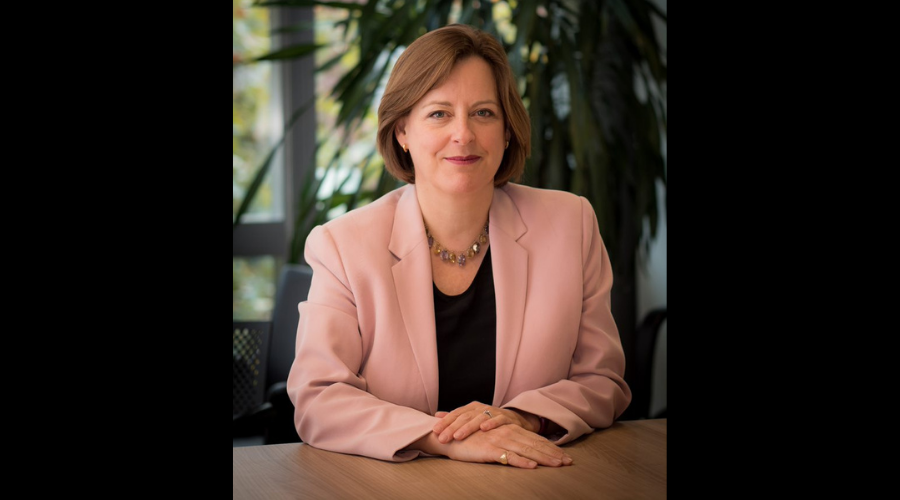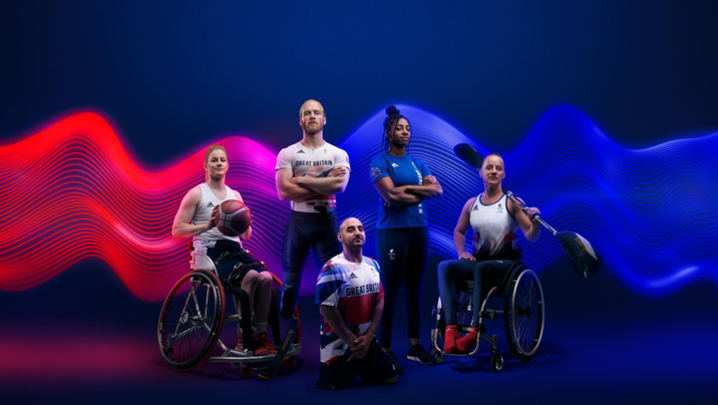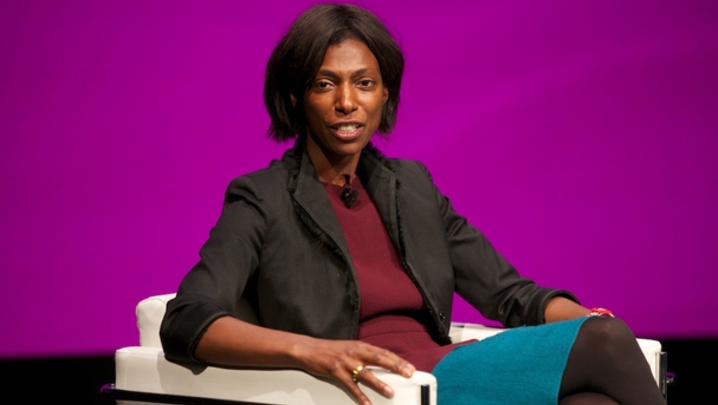Steve Clarke profiles the regulator’s CEO, Melanie Dawes, who is also a trustee of youth charity the Patchwork Foundation.
All eyes will be on Melanie Dawes when she speaks at the RTS Cambridge Convention in mid-September. The CEO of Ofcom for the past tumultuous 18 months was preceded by the charismatic Sharon White – a star attraction at the conference whenever she spoke.
“Melanie Dawes is the most experienced and impressive Chief Executive that Ofcom has had,” opines an industry insider. And this will be the first opportunity most of her audience has had to hear her in person, thanks to the pandemic.
From a broadcasting perspective, Dame Melanie’s Cambridge appearance could not be more timely. Her in-tray is bulging. A media white paper is due later this autumn and will follow Ofcom’s 70-page report on public service broadcasting published in July.
The document called for greater flexibility and heralded “the biggest shake-up in PSB for 20 years,” according to Dawes, a civil service veteran of more than three decades. “Our plan of action sets out how the industry, government and Ofcom can together build a stronger system of public service media that can thrive in the digital age,” she promised.
Some, however, bridled at that expression “public service media”. They wondered if the definition could ultimately lead to greater pressure on the existing PSBs – perhaps resulting in more top slicing of the BBC licence fee.
Colin Browne, Chair of the Voice of the Listener & Viewer, says: “Ofcom’s PSB recommendations were good on prominence, but otherwise were open-ended and allow the Government a lot of leeway to do whatever it wants.
“We’re concerned about what the criteria are for measuring public service delivery and that other players can have PSB benefits as part of the reinvention of PSB as public service media.”
There is little doubt that Dawes’s tenure at Ofcom comes at a particularly sensitive juncture both for Ofcom, as it is still without a chair, and the sectors it is responsible for regulating.
“It must be a very nervous time for Dame Melanie – although all her life she has had to find a way to deal with mad politicians of all parties, which gives you a particular mindset,” says a senior broadcaster.
He continues: “She is quite adroit at delivering what her masters or mistresses want and finding her way through the political thicket. There’s a downside to that – because, sometimes at Ofcom, you have to stand up for stuff that matters.”
Some believe that Ofcom’s arm’s length relationship with government is threatened after reports that the Prime Minister wanted ex-Daily Mail editor Paul Dacre as the regulator’s new Chair, and the Government refused to renew two Channel 4 board appointments in the spring, despite Ofcom’s approval.
Stewart Purvis, a former Ofcom head of content and CEO of ITN, says: “There is concern that Melanie Dawes, who doesn’t have any experience of the sector Ofcom regulates, still lacks a permanent Chair to help steer her through what are incredibly complex issues.
“Sharon White had Lord Burns and, before that, Patricia Hodgson. Both brought a lot of broadcasting expertise to Ofcom’s decision-making.
“It is vital that someone suitably qualified is appointed chair so Ofcom can demonstrate unequivocally that it is independent of the Government, while taking account of its views but standing up to the Government where it feels it is necessary.”
‘Mono-cultures [are] not healthy for any organisation’
Interviewed by Times Radio in July, Dawes insisted that Ofcom was “scrupulously independent”, adding: “I would be really surprised if any new Chair arriving in Ofcom didn’t feel that sense of independence.”
Aside from broadcasting, there is the crucial question of online regulation. The watchdog is engaged in hiring between 250 and 300 new staff (it currently employs around 1,000 people) to undertake the challenging task of regulating social media.
“I certainly think we need to grow new skills, we know that; and particularly to get into regulating the social media platforms, we’ve got to recruit more people who have direct experience of emerging and online technologies,” acknowledged Dame Melanie in her interview.
She was fiercely vocal in her criticism of the racist social media abuse of England’s footballers Marcus Rashford, Jadon Sancho and Bukayo Saka after each missed penalties in the shoot-out against Italy in the Euros final. Tellingly, she said that companies such as Twitter had acted too slowly in removing abuse.
Dawes, who is married to the ex-Daily Mail and Daily Telegraph political editor Benedict Brogan, is steeped in navigating Whitehall’s corridors of power. She joined the Civil Service as an economic assistant in 1989, having been educated at Malvern Girls’ College and New College, Oxford, before doing postgraduate economics at Birkbeck College, London.
Two years ago, on the 30th anniversary of her becoming a civil servant, she tweeted: “Five departments and seven elections later, I can honestly say it’s never been boring. Above all, I’ve been lucky to work with amazing people inside and outside the #BrilliantCivilService.”
The most prominent female civil servant in the UK, Dawes’s gilded Whitehall career included 15 years at the Treasury, three and a half at the Cabinet Office and, in 2015, she became Permanent Secretary at what is now the Ministry of Housing, Communities and Local Government.
Her non-executive roles have included the consumer body Which? and she is a trustee of the Patchwork Foundation, which helps under-represented young people get involved in democracy.
We know little about what Dame Melanie enjoys on TV other than that she is a devoted fan of Strictly: in 2019, she tweeted to congratulate the show on Motsi Mabuse replacing Darcey Bussell – a “fab new judge”, she opined.
Her commitment to improving workplace diversity is well known. In 2015, she wrote: “I strongly believe that diversity is not just a nice-to-have – if we want to work effectively on behalf of the communities we serve, we must be representative of them. And there is no doubt that mono-cultures can develop if everyone comes from the same background. That’s not healthy for any organisation.”
Ofcom’s apparent inability to crack the whip in relation to broadcasters’ unwillingness to radically move the dial on diversity was the subject of an article by Marcus Ryder in these pages just over a year ago.
But it looks as if Dame Melanie is determined to see real change across the UK broadcasting landscape. Appearing before the House of Commons Digital, Culture, Media and Sport Committee in December 2020, she said that, to rebuild trust, broadcasters should bring back into the industry the ethnic-minority people who had left it – “the generation of people out there who might have come through but were not able to”. Expect her to be on the BBC’s case when it comes to having a more diverse management team.
Questioned about the appointment of “yet another” white, middle-class male to the BBC Director-General role, Dawes criticised the lack of representation in the corporation’s upper ranks: “The BBC structure is not representative on most measures and that is a real issue.”
Veteran diversity campaigner Simon Albury, Chair of the Campaign for Broadcasting Equality, is impressed. He is not alone in discovering her eagerness to win over people in the TV sector. “She is relaxed and charming and open to hearing what you have to say,” he says. “Dame Melanie has the kind of confidence that puts you at ease.”
How her people skills – she once said that kindness was an underrated leadership quality – play out in Ofcom’s relationship with the BBC remains to be seen. However, there are signs that Tim Davie’s relationship with the regulator has got off to a good start. Any initial resentment the BBC had over being regulated by Ofcom has, it seems, largely evaporated.
“The BBC hated having an outside regulator,” says a rival broadcaster. “It had been marking its own homework for almost 100 years and disliked having an outside regulator with opinions on things such as regional investment and diversity. But Tim Davie is much more pragmatic and will want to make the relationship work.”
Dame Melanie Dawes is a UK keynote speaker at the RTS Cambridge Convention 2021.





